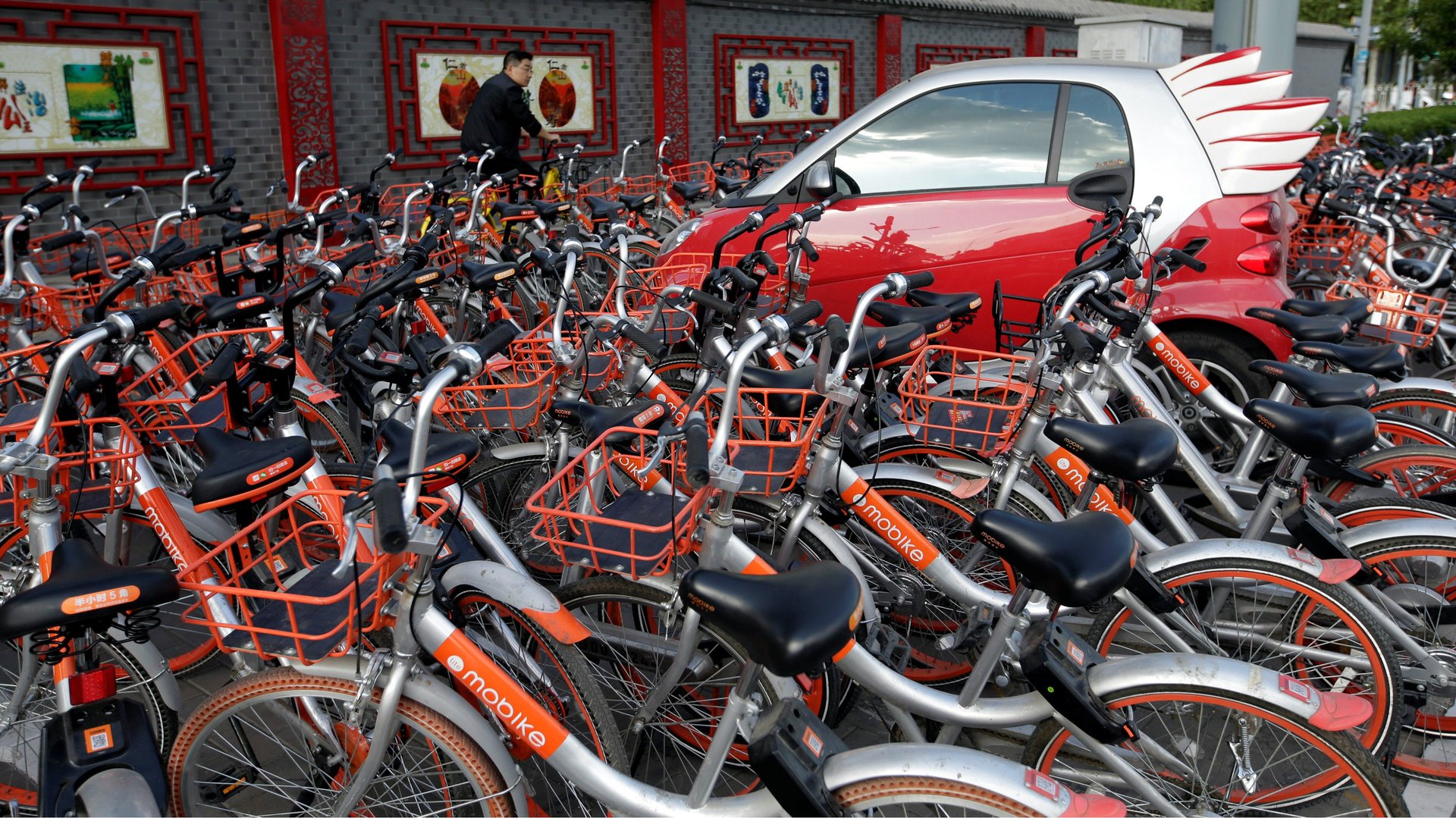A deal to buy a Chinese bike-sharing giant will accelerate the rivalry for consumer movement data
With a multibillion-dollar acquisition, a Chinese start-up rivalry that has been running for years is losing importance, and a new one is deepening.


With a multibillion-dollar acquisition, a Chinese start-up rivalry that has been running for years is losing importance, and a new one is deepening.
Chinese food-delivery giant Meituan is buying Shanghai-based Mobike, one of China’s leading bike-sharing firms, for a reported value of $2.7 billion, excluding debt, according to a report Wednesday from Chinese media outlet Yicai. That’s slightly lower than the $3 billion valuation (paywall) that Mobike had as of last June. The deal includes a mix of $1.2 billion in cash and $1.5 million in equity, and will also see Meituan assume Mobike’s nearly $1 billion in debt, the site adds.
The deal, when completed, means the rivalry to watch most closely in coming years is the one between Meituan and Didi Chuxing, China’s answer to Uber, both of whom want to become powerful brokers for transportation and delivery.
While the companies haven’t yet released a statement on the deal, comments by company executives confirmed the news. In an internal letter released by Chinese media outlet 36kr, Meituan CEO Wang Xing wrote (link in Chinese) that Mobike “has become a member of the family.” On WeChat, China’s most popular chat app, Mobike co-founder Hu Weiwei also acknowledged the news in a public post. “Many people view Mobike as a transportation tool, but in fact I’ve always called it a “joyful lifestyle” that brings us back to simplicity, nature, health, and not recklessly chasing materialism. ‘Live better’ is also the vision of Meituan, on this point we have a huge space for imagination,” she wrote.
Mobike and Meituan did not reply to calls and emails asking about the deal.
Mobike versus Ofo…
Mobike, along with Ofo, spearheaded a startup trend in China starting about three years ago that saw dozens of companies flood the market with rentable bikes, unlockable via smartphone and that could be picked up and dropped off anywhere. The companies charged prices as low as 1 yuan (US$0.16) for a 30-minute ride, paid for via WeChat or Alipay, two of China’s most popular online payment services.
Throughout 2017 a rainbow assortment of copycat bikes rentals filled the streets of China’s major cities as investors piled in, much to the chagrin of municipal agencies. Now though, only Mobike and Ofo remain, as stiff competition and thin profit margins forced many to shut down. A former Mobike manager who asked to remain anonymous told Quartz that these pressures likely gave Meituan, a Mobike investor, favorable terms on on the purchase.
While Mobike and Ofo will continue to be rivals, they’ll really be proxies in a much larger battle.
…becomes Meituan versus Didi
Currently valued at $30 billion (about equal to AirBnB) and said to be seeking a $60 billion IPO, Meituan is fast becoming an internet giant that rivals Baidu, Alibaba, and Tencent, China’s leaders in search, e-commerce, and social media respectively. Originating as a Groupon-esque coupon site, it has become a go-to destination for restaurant reviews and venue listings, then moved into food delivery, and is now expanding into travel bookings and ride-hailing. This makes it a rival of Didi Chuxing, known for booting rival ride-hailing firm Uber out of China.
In January, Didi began rolling out its own bike-sharing service, using a combination of in-house bikes and bikes from Ofo, which it funded in 2016. Last month reports surfaced it will enter food delivery as well. It’s possible that Meituan’s purchase of Mobike will spur Didi to do the same with Ofo.
What’s the future of Mobike under Meituan? A former Mobike manager tells Quartz that Mobike can become profitable as long as each of its bikes generates four rides a day. Right now, they’re generating only about one or two rides each day, according to a former manager. This means the service will likely be loss-making for Meituan. “They might make money, but they’ll probably just break even and just be this 10 million daily active user app that generates a lot of data,” he says.
This data could prove very useful, however. Mobike has helped turn bike-sharing into a bonafide phenomenon in China—a new form of transportation that complements ride-hailing, traditional taxis, and the subway. It knows how millions of Chinese consumers complete short-distance journeys. China’s tech giants, meanwhile, are racing to become data-sucking machines that offer a number of products and services that at times are unrelated to each other.
Jeffrey Towson, a professor of investment at Peking University, says that Meituan’s acquisition of Mobike fits into this trend. For instance, this week, e-commerce king Alibaba completed an acquisition of its own—in Ele.me, a food-delivery app that remains a rival to Meituan.
“Alibaba is becoming a marketplace platform with products, service and entertainment. Didi is becoming a mobility platform that offers ride-sharing, bike-sharing, car rentals, and so on,” he says. “It’s becoming a fight for who has the consumer and the data for a particular area.”